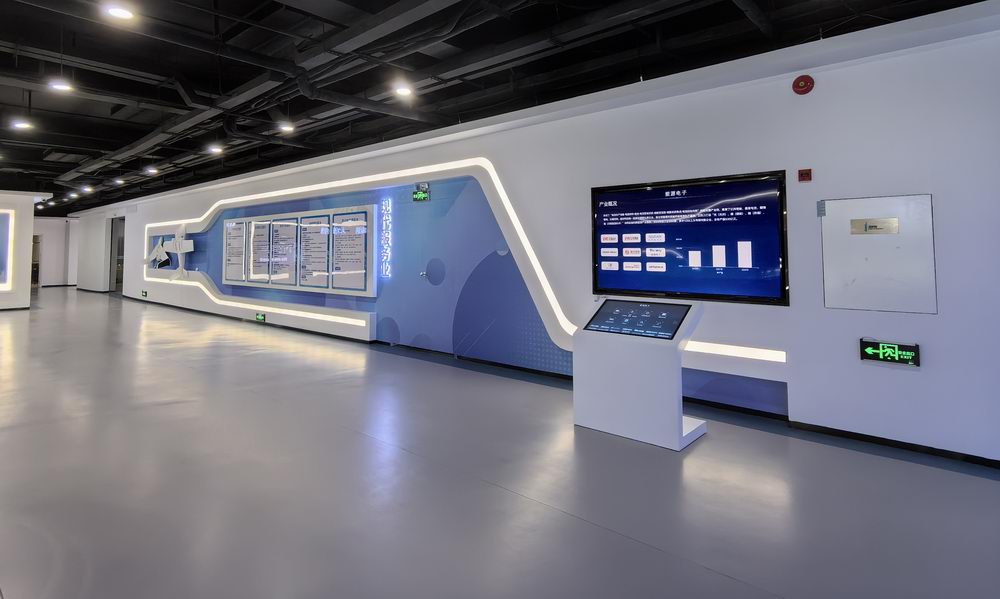How the Digital Economy Shapes High-Quality Development

The digital economy is revolutionizing industries at an unprecedented rate, significantly contributing to the U.S. GDP by making up 10.3% of the total annual GDP. With a growth rate of 4.90%, it surpasses the U.S. GDP growth rate of 1.65%. High-quality development emphasizes sustainability and long-term growth. The Digital Economy and Real Economy Integration Zone introduces a new model for achieving high-quality development. In this context, the Huizhou Zhongkai High-tech Zone's National Foreign Trade Transformation and Upgrading Base, along with its Electronic Information Cloud Platform, plays a crucial role in supporting enterprises, thereby enhancing their growth and competitiveness.
Understanding the Digital Economy
Definition and Scope
The digital economy connects people, businesses, and devices through technology. It includes essential technologies that link data and operations. This connection transforms how industries function. The digital economy supports small businesses and entrepreneurs by enabling new processes and capabilities.
Key Components of the Digital Economy
Key components include software, cloud computing, and e-commerce. These elements drive economic growth. They offer tools for innovation and efficiency. Businesses use these tools to enhance productivity and competitiveness.
Global Impact and Trends
The digital economy has a global impact. It reshapes international trade and supply chains. Research shows that data acts as an asset. This change offers a complete picture of global commerce. Many countries invest in digital infrastructure to stay competitive.
Technological Innovations
Technological innovations play a crucial role. They drive the digital economy forward. Innovations create new opportunities for growth and development.
Role of AI and Machine Learning
AI and machine learning transform industries. They improve decision-making and automate processes. Businesses use AI to analyze data and predict trends. This technology enhances efficiency and reduces costs.
Impact of Blockchain Technology
Blockchain technology offers secure transactions. It provides transparency and trust. Many industries adopt blockchain for its reliability. This technology supports digital contracts and decentralized systems.
The Huizhou Zhongkai High-tech Zone's Electronic Information Cloud Platform exemplifies these innovations. It supports enterprises in the zone. The platform enhances growth and competitiveness. Businesses benefit from advanced digital tools and resources.
High-Quality Development Explained
Characteristics of High-Quality Development
Sustainability and Inclusivity
High-quality development focuses on creating a sustainable future. Businesses prioritize eco-friendly practices to reduce environmental impact. Communities benefit from inclusive growth. Everyone gains access to opportunities. The digital economy supports this by providing tools for efficient resource use. Companies in the Zhongkai High-tech Zone leverage these tools. The Electronic Information Cloud Platform helps them adopt sustainable practices. Enterprises find ways to minimize waste and maximize productivity.
Innovation and Long-term Growth
Innovation drives high-quality development. Companies invest in research and development. New technologies emerge, boosting efficiency. Long-term growth becomes achievable through continuous improvement. The digital economy fosters a culture of innovation. Businesses in the Zhongkai High-tech Zone thrive with access to cutting-edge technology. The cloud platform offers resources for experimentation. Enterprises explore new business models and strategies. This environment encourages creativity and progress.
Measuring High-Quality Development
Economic Indicators
Economic indicators provide insights into development quality. Metrics like GDP growth and employment rates matter. The digital economy influences these indicators positively. Businesses experience increased productivity and profitability. The Zhongkai High-tech Zone showcases this impact. Enterprises utilize the Electronic Information Cloud Platform for data analysis. They gain valuable insights into market trends. Decision-making improves, leading to economic growth.
Social and Environmental Metrics
Social and environmental metrics assess development's broader impact. Factors like education, health, and pollution levels are crucial. The digital economy contributes to improvements in these areas. Companies adopt technologies that enhance social well-being. The Zhongkai High-tech Zone serves as a model for this integration. The cloud platform supports initiatives for better living conditions. Enterprises implement solutions that benefit society and the environment. This approach ensures holistic progress.
Digital Economy and Real Economy Integration Zone

A New Model for High-Quality Development
Digitalization of Industries
The digital economy transforms industries by integrating technology into every aspect. Businesses in the Zhongkai High-tech Zone benefit from this shift. The Electronic Information Cloud Platform supports companies with advanced digital tools. Enterprises use these tools to streamline operations and boost efficiency. Digitalization reduces costs and enhances productivity. Companies can adapt quickly to market changes.
New Business Models
New business models emerge with digital transformation. The cloud platform in the Zhongkai High-tech Zone helps businesses innovate. Enterprises explore fresh strategies to meet customer needs. Digital tools enable flexible and scalable operations. Companies can reach broader markets and improve customer engagement. This innovation leads to sustainable growth and competitiveness.
Societal Benefits
Improved Quality of Life
The integration of digital and real economies enhances quality of life. Businesses in the Zhongkai High-tech Zone contribute to community well-being. The cloud platform supports initiatives that improve living standards. Access to digital services makes life more convenient. People enjoy better healthcare, education, and communication. The digital economy fosters a more connected and efficient society.
Enhanced Access to Services
Digital transformation increases access to essential services. The Electronic Information Cloud Platform provides resources for businesses to expand offerings. Companies can deliver services more effectively and reach underserved areas. This expansion improves access to information, healthcare, and education. The digital economy bridges gaps and creates opportunities for all.
Case Studies:
Netflix and Amazon show how digital transformation drives success. These companies embraced technology to revolutionize their industries.
Developing countries leverage digital ecosystems for economic growth. Governments, enterprises, and civil societies play crucial roles in this process.
Challenges and Opportunities

Challenges in the Digital Economy
Data Privacy and Security
Data privacy and security present significant hurdles in the digital economy. Companies collect vast amounts of personal data. This practice raises concerns about how businesses handle and protect this information. The American Privacy Rights Act (APRA) aims to set boundaries on data collection and processing. These regulations ensure individuals can access, correct, and delete their personal data. Companies must also assess algorithms for potential biases. The Blueprint for an AI Bill of Rights highlights the risks of automated decision-making. Safeguards are necessary to prevent discrimination and exclusion. Businesses must prioritize transparency and user control.
Digital Divide
The digital divide remains a pressing issue. Not everyone has equal access to digital resources. This gap affects education, employment, and economic opportunities. Urban areas often have better internet access than rural regions. The disparity creates challenges for those without reliable connectivity. Bridging this divide requires investment in infrastructure. Governments and organizations must work together. Providing affordable internet access is crucial. Efforts should focus on underserved communities. Equal access ensures everyone benefits from digital advancements.
Opportunities for High-Quality Development
Policy and Regulation
Policy and regulation offer avenues for high-quality development. Governments can create frameworks that encourage innovation. Clear guidelines help businesses navigate the digital landscape. Policies should promote fair competition and consumer protection. Regulations can address data privacy and security concerns. Encouraging ethical practices benefits society as a whole. The Huizhou Zhongkai High-tech Zone serves as a model. The zone's policies support enterprise growth and competitiveness. Businesses thrive with clear rules and supportive environments.
Investment in Digital Infrastructure
Investment in digital infrastructure unlocks potential for growth. Robust networks enable businesses to operate efficiently. The Electronic Information Cloud Platform in the Zhongkai High-tech Zone exemplifies this. The platform provides advanced tools and resources. Enterprises gain access to cutting-edge technology. This support enhances productivity and innovation. Companies can explore new business models and strategies. Investment in infrastructure bridges the digital divide. Everyone can participate in the digital economy. Sustainable growth becomes achievable through these efforts.
The digital economy plays a pivotal role in shaping high-quality development. The Huizhou Zhongkai High-tech Zone's Electronic Information Cloud Platform exemplifies this by supporting enterprises and enhancing their growth. This platform provides essential tools that help businesses innovate and compete effectively. The future holds promising prospects as technology continues to evolve. Companies focusing on digital activities like cloud infrastructure and e-commerce are well-positioned for growth. Embracing digital transformation is crucial. Businesses should leverage these opportunities to drive innovation and achieve sustainable development.
See Also
Innovating Forward: Huizhou Zhongkai High-tech Zone's Path to Excellence
Global Empowerment: Zhongkai High-tech Zone's Role in Electronics
Empowering Electronics: Zhongkai High-tech Zone's Industry Evolution
Prosperity Propelled: Huizhou Zhongkai High-tech Zone's Impact
Revolutionizing Commerce: Zhongkai High-tech Zone's Influence
Zhongkai High tech Zone National foreign trade transformation and Upgradi Base(Electronic Information)Cloud Platform.
Address: Zhongkai High-tech Zone,Huizhou City ,Guangdong,China
E-mail: huizhoueii@163.com 13510001271@163.com
Tel: +86-0752-3279220 Mobile: +86-13510001271


